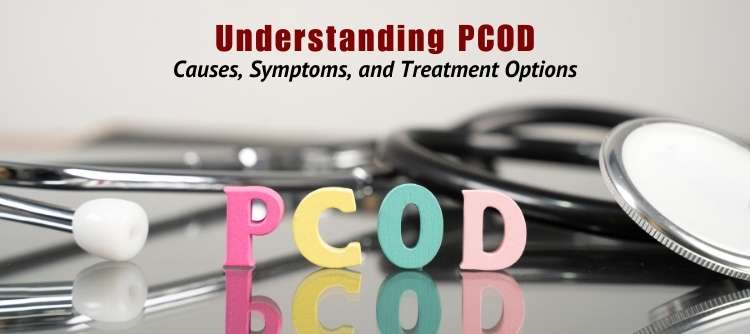Understanding PCOD: Causes, Symptoms, and Treatment Options

What is PCOD?
Polycystic Ovary Syndrome (PCOS), commonly referred to as PCOD, is a hormonal disorder that affects women of reproductive age. It is characterized by an imbalance of reproductive hormones, leading to various symptoms such as irregular menstrual cycles, ovarian cysts, and hormonal imbalances. PCOD can also impact fertility and increase the risk of other health complications if left untreated.
What are the Symptoms of PCOD?
Irregular Menstrual Cycles: PCOD women frequently have abnormal menstrual cycles, which can be heavy, irregular, or protracted.
Ovarian Cysts: PCOD can cause the ovaries to develop small cysts, which are fluid-filled sacs that can lead to discomfort and pain.
Hormonal Imbalances: Elevated levels of androgens (male hormones) in women with PCOD can result in symptoms such as acne, hirsutism (excess hair growth), and male-pattern baldness.
Weight Gain: Many women with PCOD struggle with weight gain or difficulty losing weight, particularly around the abdomen.
Insulin Resistance: PCOD is often associated with insulin resistance, a condition where the body’s cells become less responsive to insulin, leading to high blood sugar levels.
Infertility: PCOD can interfere with ovulation, making it difficult for women to conceive naturally, which may require female infertility treatment in Jaipur, Rajasthan
What is the Cause of PCOD?
Hormonal Imbalance: PCOD is primarily caused by hormonal imbalances, particularly elevated levels of androgens and insulin.
Genetics: There is evidence to suggest that genetics play a role in the development of PCOD, as it tends to run in families.
Insulin Resistance: Insulin resistance is a common feature of PCOD and can contribute to the hormonal imbalances seen in this condition.
Lifestyle Factors: Poor diet, lack of exercise, and excess weight can exacerbate PCOD symptoms and contribute to insulin resistance.
What are some complications associated with PCOD?
Polycystic Ovary Disease (PCOD) can lead to various complications that affect both reproductive and overall health. Some of the common complications associated with PCOD include:
Infertility: PCOD is one of the leading causes of female infertility, as hormonal imbalances and irregular ovulation can make it difficult for women to conceive naturally. Seeking assistance from an infertility doctor in Jaipur is crucial for those struggling to conceive, as specialized treatments and interventions may be necessary.
Metabolic Syndrome: PCOD increases the risk of developing metabolic syndrome, a cluster of conditions including high blood pressure, high blood sugar, abnormal cholesterol levels, and excess abdominal fat. This combination of factors significantly raises the risk of heart disease, stroke, and type 2 diabetes.
Type 2 Diabetes: Insulin resistance, a common feature of PCOD, can lead to elevated blood sugar levels and eventually result in type 2 diabetes if left unmanaged. Proper lifestyle modifications, including dietary changes and regular exercise, are essential in reducing this risk.
Endometrial Cancer: Women with PCOD have a higher risk of developing endometrial (uterine) cancer due to irregular menstrual cycles and prolonged exposure to estrogen without ovulation. Regular gynecological screenings are essential for early detection and prevention.
How is PCOD diagnosed?
A combination of the patient’s medical history, physical examination, and laboratory testing is usually used to diagnose PCOD. The following steps are commonly used to diagnose PCOD:
Medical History: Your doctor will inquire about your menstrual history, symptoms, and family history of PCOD or related conditions.
Physical Examination: A physical examination may include measuring blood pressure, body mass index (BMI), and evaluating signs of PCOD such as acne, hirsutism (excess hair growth), and abdominal obesity.
Blood Tests: Blood tests may be conducted to measure hormone levels, including testosterone, luteinizing hormone (LH), follicle-stimulating hormone (FSH), and insulin levels. Elevated levels of androgens and insulin are common in women with PCOD.
Imaging Studies: Transvaginal ultrasound may be performed to visualize the ovaries and identify the presence of ovarian cysts, which are a common feature of PCOD.
What is the most effective treatment for PCOD?
The most effective treatment for Polycystic Ovary Disease (PCOD) varies depending on individual symptoms, goals, and overall health. However, several treatment options are commonly used to manage PCOD effectively:
Lifestyle Modifications: Adopting a healthy lifestyle is often the first line of defense against PCOD. This includes maintaining a balanced diet, engaging in regular exercise, managing stress levels, and achieving a healthy weight. These lifestyle modifications can help improve insulin sensitivity, regulate hormone levels, and alleviate symptoms associated with PCOD.
Medications: In some cases, medications may be prescribed to manage specific symptoms of PCOD. These may include oral contraceptives to regulate menstrual cycles, anti-androgen medications to reduce symptoms of hirsutism and acne, and insulin-sensitizing drugs such as metformin to improve insulin resistance.
Fertility Treatments: For women struggling with infertility due to PCOD, specialized fertility treatments may be recommended. These may include ovulation induction medications, such as clomiphene citrate or letrozole, to stimulate ovulation, or assisted reproductive technologies (ART) such as in vitro fertilization (IVF) to help achieve pregnancy.
Surgery: In rare cases, surgical interventions such as ovarian drilling may be considered to treat PCOD. This minimally invasive procedure involves making small incisions in the ovaries to destroy the ovarian tissue responsible for producing excess androgens.
Conclusion:
In conclusion, Polycystic Ovary Disease (PCOD) is a complex hormonal disorder that requires tailored treatment approaches to effectively manage symptoms and improve overall health. For women experiencing PCOD-related infertility, seeking assistance from specialized clinics offering female infertility treatment in Jaipur, Rajasthan, is crucial. Experienced infertility doctors in Jaipur can provide comprehensive evaluation, personalized treatment plans, and compassionate care to address PCOD-related fertility challenges and help women achieve their dream of parenthood. By prioritizing proactive management and seeking professional support, women with PCOD can navigate their fertility journey with confidence and optimism. Don’t hesitate to reach out for assistance and guidance in managing PCOD effectively and improving reproductive health outcomes.
